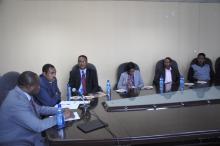WHO Donates Minilabs to Strengthen Control of SSFFC
Substandard, spurious, falsely labelled, falsified and counterfeit (SSFFC) medical products pose an unacceptable risk to public health. SSFFC medical products affect every region of the world, and all major therapeutic categories of medicines, including vaccines and diagnostics. They harm patients and undermine confidence in medical products, healthcare professionals and health systems.
WHO conducts range of activities with Member States and stakeholders to minimize the risks from such products, including developing policies, identifying good practices, engaging in data collection and analysis and issuing alerts, to better inform decision making in investing to secure supply chains and build regulatory capacity.
The WHO Ethiopia Country Office supports the Food, Medicines and Healthcare Administration and Control Authority of Ethiopia (FMHACA) in strengthening regulatory systems through the development of guidelines, capacity strengthening by way of staff trainings, production of manuals, and technical and material support.
On 30 December 2015, WHO donated three minilabs as a continuation of the technical assistance towards the fight against the circulation of SSFFC medical products. These minilabs will help strengthen quality control and inspection at entry and exit ports. The portable nature of the mini-labs will also make it possible to extend inspection at other relevant sites as needed.
Speaking at the hand-over ceremony, Dr Paul Mainuka, Officer in Charge of WHO Ethiopia, appreciated the Government’s commitment to halt the circulation of SSFFC medical products in Ethiopia, “I know [these minilabs] will be instrumental in building the central and regional quality assurance capacity of FMHACA in the detection of SSFFC medical products that may be in circulation in different parts of the country and help avert negative patient outcomes.”
Although there is encouraging progress and effort to prevent the circulation of SSFFC medical products, gaps still remain as per a survey conducted in 2013. As per the needs identified in the survey, Ethiopia has developed a five-year strategic plan to tackle SSFFC medical products.
Mr Yehulu Denekew, Director General of FMHACA, thanked WHO for past and present support, including participation in the development of FMHACA’s five-year strategic plan to tackle SSFFC medical products. The five-year plan includes strengthening regulatory collaboration among IGAD countries, strengthening consignment test and market surveillance, testing all medicines in quality control laboratories and strengthening inspection at entry and exit ports.
WHO Ethiopia will continue working closely with the Ministry of Health to ensure the control of SSFFC medical products and strengthen local production of medical products.
For more information, please contact:
Technical Contact: Abraham Gebregiorgis; %20gebregiorgisa [at] who.int (gebregiorgisa[at]who[dot]int) ; +251 913 539 763
Communication Contact: Loza Mesfin Tesfaye ; %20tesfayel [at] who.int (tesfayel[at]who[dot]int) ; +251 911 144 194
Photos: WHO Ethiopia/ Loza Mesfin







